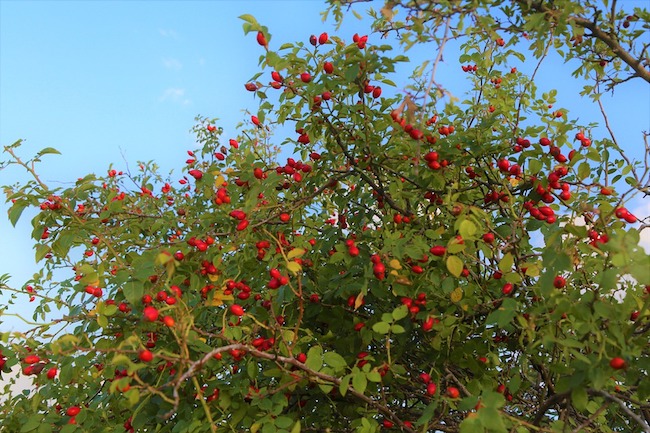3 Benefits For Using Rosehips To Boost The Immune System By Misty Anderson for Natural Blaze
While no cure exists for the common cold, there are some immune-boosting plants that can reduce the duration and severity of colds, and one of those may just be in the backyard – rosehips. They are the berry on the rose bushes. Rosehips develop just below the flower, and they hold the rose’s seeds. They can be harvested in the fall when the rosehips turn an orange-red color.
Rosehips are simple to harvest – just pull them off their branches; however, wear gloves to protect hands and arms from their thorns. Once picked, wash the rosehips, slice off their ends with a sharp knife, and then remove the seeds. The seeds contain tiny hairs that need to be removed before ingesting otherwise they will irritate the stomach lining. Crush the rosehips and use them immediately or place them in a warm place for 5 to 7 days to let them dry.
- High in vitamin C and phenolic and flavonoid antioxidants
Raw rosehips contain copious amounts of vitamin C, but dried rosehips lose some of their vitamin C content. Rosehips contain high levels of phenolic and flavonoid antioxidants. Flavonoids cannot be produced within the human body; they must be consumed. Dr. David Nieman recommends between 400-500 mg of flavonoids per day, but the average person only intakes 50 mg. The average person has a deficit. The benefits of a high flavonoid intake are the following:
- Fights anti-inflammation
- Prevents cardiovascular disease
- Reduces risk of colds and chronic disease
- Maintain a healthy weight
- Less risk of dementia
- Combats oxidative stress
- Aides in muscular recovery
- Improves gut microbiomes and the immune system
(The Benefits of Antioxidants: Polyphenols and Flavonoids (vitapodworld.com)
In 2018, Dr. Kaj Winther conducted a study with 120 people. “During the six winter months in Denmark, the volunteers reported their incidences of colds. They also reported the duration and the symptoms when they had a cold. The researchers found of the 107 volunteers who completed the study, 21 of 58 people in the placebo group reported having a cold. That is over 53 percent of the group. During the same period, only 24 out of 54 people in the rosehips group got a cold. That is 43.6 percent compared to the 53.4 percent in the placebo group.” (Rose Hips Reduce Colds and Common Cold Severity – Journal of Plant Medicines) Case Adams, PHD, found that the group that had the rosehips had milder symptoms, i.e., less headaches, muscle stiffness, and fatigue.




